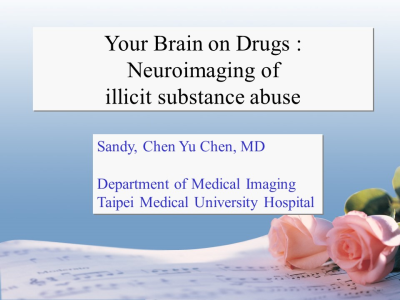|
Sunrise Session
Your Brain on Drugs: Other |
|
Your Brain on Drugs: Nicotine & Ecstasy
Sunrise Session
ORGANIZERS: Andre Obenaus, Pia Maly Sundgren
Thursday, 21 June 2018
| S05 |
07:00 - 07:50 |
Moderators: Patricia Grant, Robert Witte |
Session Number: S-Th-07
Overview
The sunrise sessions will provide an overview of the effects of common legalized drugs (alcohol, nicotine, cannabis) and their effects on the developing and adult brain.
Target Audience
Basic scientists to clinicians will benefit from this overview of the effects of alcohol, nicotine, and cannabis using neuroimaging as a biomarker.
Educational Objectives
As a result of attending this course, participants should be able to:
-Name the current knowledge of the effects of drug exposure to brain;
-Identify the neuroimaging methods/techniques to investigate drug exposure; and
-Describe the changes to the developing brain as a result of drug use.
07:00
|
|
 Nicotine & the Brain Nicotine & the Brain
Minming Zhang
|
07:25
|
 |
 Your Brain on Drugs : Neuroimaging of Illicit Substance Abuse Your Brain on Drugs : Neuroimaging of Illicit Substance Abuse
Cheng-Yu Chen
Substance abuse is a global health threat, particularly among the young generation. Use of Illegal substance can lead to structural damage of the brain and long-term effects on neurological function. In this serial “your brain on drugs” sunrise courses, legal recreational substance abuse such as nicotine, alcohol, and cannabis, will be covered in earlier sessions, this talk focuses on illegal substances, including amphetamine and its derivatives (MDMA, a.k.a. Ecstasy), cocaine, heroin, and solvents (toluene and N2O). Most of the illegal substances are lipid-soluble and easily entering the central nervous system, producing quick effects on neurons and eliciting addiction. The mechanisms of brain injury encompass excitotoxicity, vascular injuries, and cell damages that further causes acute or subacute leukoencephalopathy. Their direct and secondary effects on the brain will be discussed along with the structural and functional MR imaging manifestations. Although the imaging findings of brain on drugs are often non-specific, some classic findings do raise high index of suspicion to the specific drug being used. It is important to understand the underlying pathomechanisms of illegal drugs to the brain, so the treatment can be improved.
|
07:50
|
|
Adjournment & Meet the Teachers |
|
| Back |
| The International Society for Magnetic Resonance in Medicine is accredited by the Accreditation Council for Continuing Medical Education to provide continuing medical education for physicians. |


